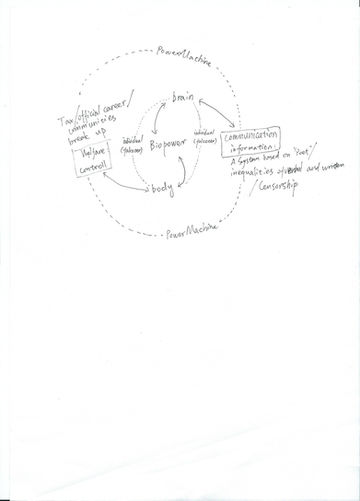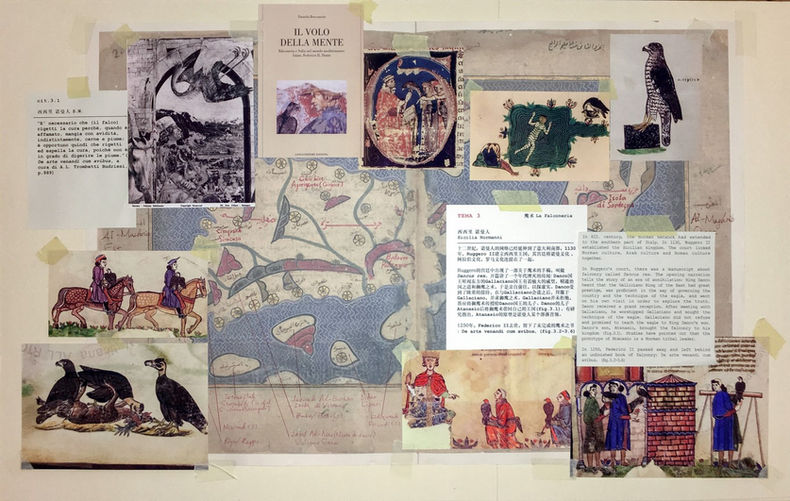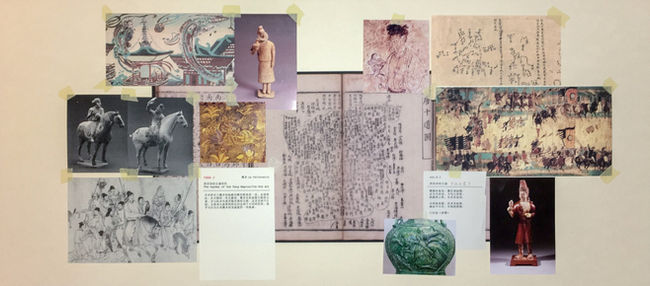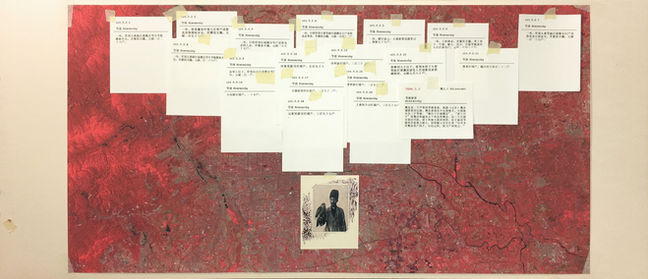La Falconeria
2° biennale di Yinchuan a cura di Marco Scotini,2018
studio delle fonti ,oggetti della falconeria
Siamo profondamente impressionati dal fatto che il potere contemporaneo è penetrato in tutti gli aspetti della nostra vita, siamo stati legati al potere facendone diventare parte del nostro corpo.
La parte di nord-ovest della Cina è una regione in cui la civiltà ha subito frequenti cambiamenti. Migliaia di anni hanno accumulato ricche fratture, offrendo varie possibilità per l'archeologia in funzione della "realtà".
Manipolando i materiali storici (e allo stesso tempo ironicamente richiama la storia “forbici e colla”), vorremmo ampliare lo spazio per la critica del potere contemporaneo.
Dal narrare i miti dell'aquila al concentrarsi su un gruppo di persone concrete, si rivela un processo di disincanto, e per tal via, indicheremo la natura diversificata del potere.
Il governo della dinastia Yuan ha fondato un sistema molto particolare chiamato “dimore dell’aquila” : in questo sistema, l'Aquila e il falconiere si sono uniti trasformandosi in uno e sono diventati un contenitore di potere. Partendo da qui, discutiamo l'operazione di biopotere e nella speranza di mettere in guardia le persone nei confronti della penetrazione del potere nella vita.
In effetti, da questo sistema, abbiamo trovato molti aspetti che sono sorprendentemente simili a quello del potere contemporaneo: il processo di concentrazione su questo gruppo multi-identità è anche una rievocazione alle preoccupazioni di ognuno di noi.

5.1.1 Daily Life
After their reunification, they went to camp by Lake Kökö on the Senggür Stream on Qara-jirügen Mountain in the Gürelgü [Mountains] on the southern side of Burqanqaldun [Mountain]. While there, they killed and ate marmots and field mice.
And so the Tayichi'ut brethren set out and left behind in the camp the widowed Lady Hö'elün, her little ones, and the mothers and their children.
Lady Hö'elün, born a woman of wisdom,
raised her little ones, her own children.
Wearing her high hat tightly [on her head],
hoisting her skirts with a sash,
she ran upstream along the Onon's banks,
gathering ölirsün and moyilsun with
which to nourish their gullets day and night.
Born with gall, the Lady their mother, reared her fortunate children.
Wielding a pointed stick of juniper,
she dug up südün and chichigina and nourished them.
With wild onions and garlic
The sons of the noble mother were nourished,
Until they became rulers.
The sons of the patient noble mother, Were reared on elm seeds.
And became wise men and lawgivers.
As Ambaqai Qahan had named both Qada'an and Qutula, all the Mongqols and the Tayichi'uts gathered together in the Qorqonaq forest by the Onon and made Qutala their qahan.
The Mongqols celebrated by dancing and feasting. Qutula was raised up as Qahan and they danced around the Many-Leaved Tree of Qorqonaq until they stood in furrows up to their ribs and made wounds up to their knees.
When Yisügei saw Dei-sechen's daughter, there was light in her face and fire in her eyes. After seeing the girl, he kept her in his thoughts.
She was ten years of age, a year older than Temüjin; her name was Börte.
Yisügei stayed overnight and asked for the girl the next day.
Dei-sechen replied: 'If, after numerous requests, I give her, I will be respected. If after only a few requests, I will be held cheap. It is not the fate of a girl to grow old in the doorway behind which she was born. I will give you my daughter. Leave your son here as my son-in-law when you go.' They agreed to the marriage, and Yisügei-ba'atur said:
'I leave my son as a son-in-law, but he is afraid of dogs. Quda, do not allow my boy to be frightened by dogs.' After saying these words, he gave his spare horse as a gift and, leaving Temüjin behind as a son-in-law, departed.
On the third day, [the Tayichi'uts] said to one another that someone had perhaps hidden [Temüjin]. 'Let us search among ourselves,' they decided. Searching among themselves, they looked in Sorqan-shira's yurt, in his cart, and under the bed. Sitting on the cart full of sheep's wool behind [the yurt], they [began to] pulled the wool out. They were just about to reach [Temüjin's] foot when Sorqan-shira said, 'In such heat, who could bear [to hide] inside the wool?' The searchers climbed down and departed.
After taking Temüjin away, Tarqutai-kiriltuq ordered his people to allow Temüjin to stay one night in each of their camps in turn.
While this was happening, on the sixteenth day of the first month of summer, the 'red circle day', the Tayichi'uts feasted together on the banks of the Onon, and dispersed at sunset. Temüjin was escorted to the feast by a weak young man. As the people left the feast, he pulled away the [rope of the] cangue from the weak boy, struck him on the head, and ran.
'If I lie down in the Onon forest, I will be seen,' he thought.
So he lay down in the torrent, with his head held back so that the cangue floated in the current. There he lay, with only his face above the water.
On their way back, while on the banks of the Bürgi, an old man of the Uriyangqad tribe, Jarchi'udai, came from Burqan-qaldun with his bellows on his back, leading his son, Jelme.
Jarchi'udai said,
'When you were at Deli'ünboldaq on the Onon, when Temüjin was born, I gave [him] swaddling clothes of sable. I also gave [you] this my son, Jelme. Thinking, however, that he was [too] small, I took him away with me. Now let Jelme put on your saddle! Let him open your [felt] door!'
With these words, he gave [his son to Temüjin].
From Botoqan-bo'orji, they moved to the Kilqo River, where they lashed together rafts to cross over to the Bu'ura Steppe.
They entered Toqto'a-beki's yurt through the smoke hole,
smashed and knocked down the door-frame,
robbed and killed his wife and son,
broke and knocked down his sacred door-frame,
and crippled and robbed his entire people.
While Toqto'a-beki was sleeping, some fishermen, sabletrappers, hunters, and sentries had arrived from the Kilqo River.
Throughout the night they had taken word that the enemy was on his way.
When the message reached Toqto'a, he joined Dayir-usun of the Uwas-Merkits and the two men went downstream along the Selengge to Barqujin [territory]. They escaped [with just] a few of their men.
'We must find some way of leaving those mothers and [their] children behind in the camp when we set out,' they said.
'Do not take them when you go!'
The next day, the Tayichi'ut man Tarqutai-kiriltuq, together with Tödö'engirte and others of the Tayichi'uts, set off down the Onon River, leaving behind Lady Hö'elün, the mothers, and the children.
When Charaqa, the old Qongqotat man, chided them, Tödö'en-girte replied,
'The deep water has dried up and The shining stone has worn away.' [With these words, they moved off]
They said to the old man Charaqa,
'Why do you reprove us?'
From behind, they struck him in the back with a spear.
Temüjin wondered if the three Merkits really had returned to their yurts or were lying in ambush. He sent Belgütei, Bo'orchu, and Jelme the Merkit to find out. They followed the Merkits for three days until the Merkits disappeared and escaped.
Temüjin then came down from Burqan and said, beating his breast,
'Because mother Qo'aqchin hears like a weasel and sees like an ermine, she saved my life.
On the dotted tracks, [I] followed the deer trails.
I made a yurt of willow.
I climbed Burqan.
On Burqan-qaldun,
my life was like that of a louse.
I managed to flee.
My only life was spared.
With only one horse I followed the elk trails.
I made a yurt of twigs.
I climbed Qaldun.
On Qaldun-burqan,
my life was like that of a swallow.
I was protected.'
'I was greatly afraid.
Every morning I shall sacrifice to Burqan-qaldun,
and every day I will pray to it.
The seed of my seed shall know this,' he said.
Facing the sun, he draped his sash round his neck and hung his hat [by its cord] from his arm. He beat his chest with his hand. Kneeling nine times towards the sun, he gave offerings and prayers.
The mark of a yurt was that, after pouring the mares' milk, they churned the kumiss all through the night, until the break of day.
'As I proceed, I shall hear that sign,' [thought Temüjin].
He arrived, and heard the sound of the churning. When he entered the yurt, Sorqanshira said to him,
'Did I not tell you to seek out your mother and your younger brothers?
Why have you come here?'
But his two sons, Chimbai and Chila'un, said,
'When the magpie hides in the bush from the sparrowhawk, the bush saves it. Now that he has come to us, how can you speak to him in such a way?'
Displeased by their father's words, they untied his cangue and burned it on the fire.
At the back [of the yurt] was a cart full of sheep's wool in which they made him sit. They bade their younger sister Qada'an care for him, and to tell no living person.
Since days of old,
we Onggirat people with the colour of our sisters' children,
the complexion of our daughters,
have never disputed with other nations over land and people.
We make our fair-faced daughters sit in the two-wheeled cart,
harnessed to a black camel,
for you who become qahans,
and send them off at a trot.
On the qatan throne we make them sit together with you.
We have never disputed with other nations over land and people.
We have reared our fair-skinned daughters,
sat them on the cart's front seat,
harnessed to a dark-grey camel,
and sent them forth. on the high throne,
we make them sit at your [majesty's] side.
From of old the Onggirat people have been shielded by the qatun,
pleaded for by daughters,
because of the colour of our sisters' children,
because of the fair complexion of our daughters.
With qoqosun and wild garlic the beautiful lady raised her admirable sons.
They became high officials and fine men.
They grew up to be good men.
They became powerful and brave.
They said among themselves,
'Let us support our mother.'
Sitting on the banks of Mother Onon,
They prepared lines and hooks with which they caught maimed and misshapen fishes.
Bending needles into fishhooks,
they caught jebüge and qadara.
Tying chilüme nets and gubchi'ur nets,
They scooped up small fishes.
[Thus,] they gratefully supported their mother.
We must cut across the Kilqo River.
Let the sedges be abundant.
Binding up our rafts with them,let us go.
That nervous Toqto'a—we will strike through the smoke hole [of his yurt],
smash and knock down his door frame,
rob and destroy his wife and son,
break and knock down his sacred door frame,
rob his entire people until they are empty.
Our sons are assessed by their camping places, our daughters are regarded for their fair complexion. Let us go to my yurt, Yisügei-quda. My daughter is young, regard her, quda.' Dei-sechen took him to his yurt and made him dismount.
A selection from
The Secret History of the Mongols
Performed by Khongor Choijinjav
La Falconeria, WUXU







